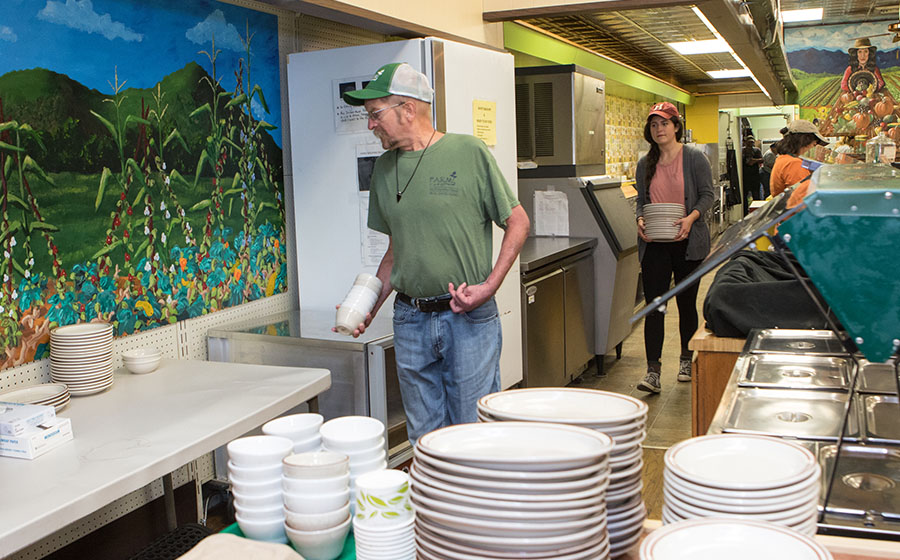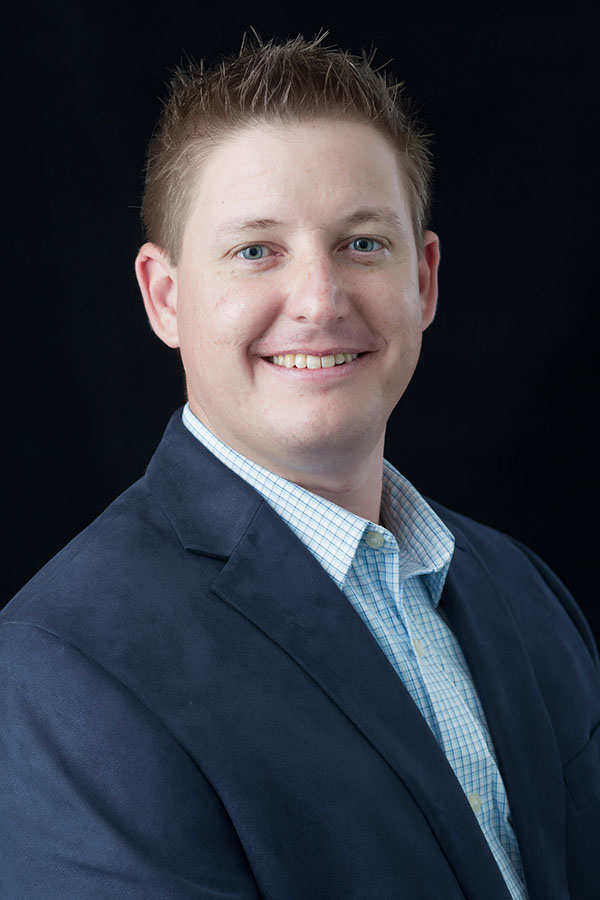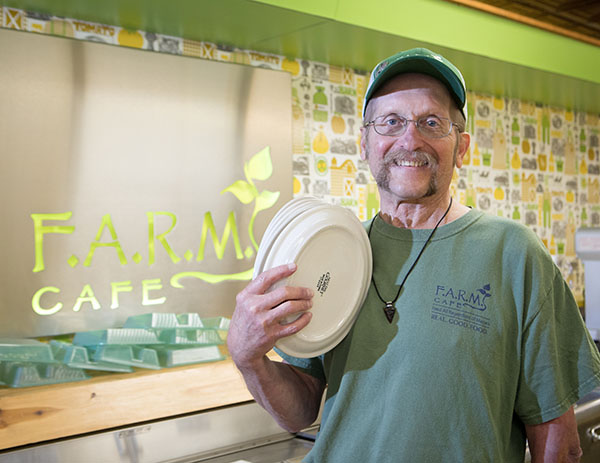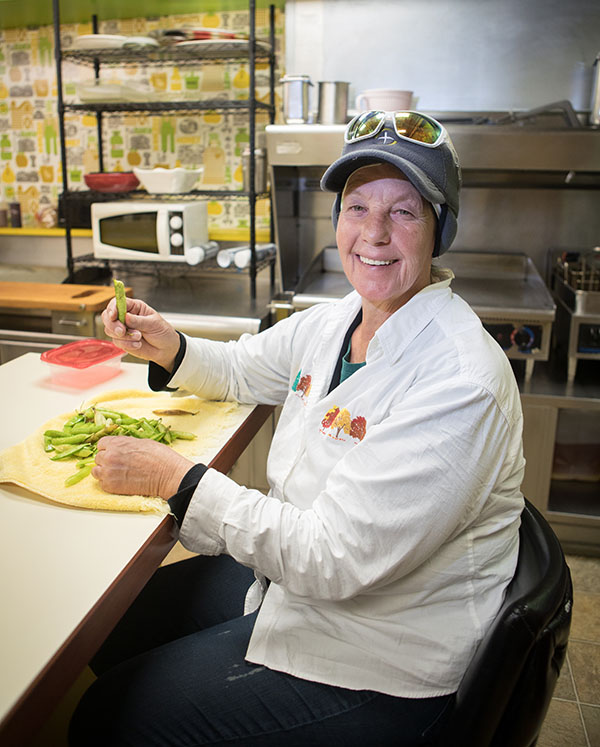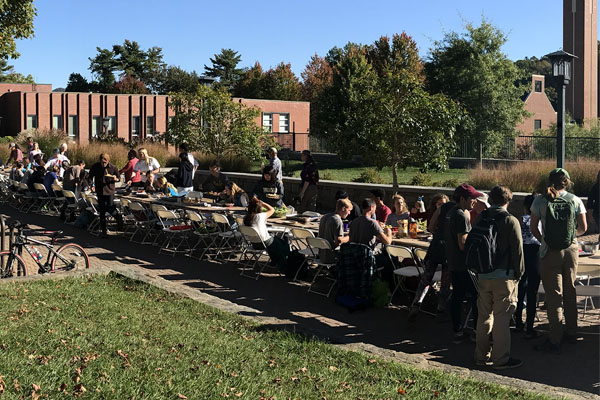An interview with Dr. Adam Hege
One in two people who use food pantries or church-based meal programs in Watauga and Caldwell counties don’t know where their next meal is coming from, said Dr. Adam Hege, an Appalachian State University public health researcher who looked at hunger in Caldwell and Watauga counties.
“From an economic perspective, if people are struggling to find food, we’ve got a public health catastrophe upon us, in terms of being able to take care of people,” Hege said.
The study was conducted in 2015 and 2016, using both focus groups and surveys. In Caldwell County, Hege worked with churches and the South Caldwell Christian Ministry. In Watauga County, he and his colleagues worked with the Hunger and Health Coalition. He is currently working on a similar study in McDowell County.
Hege is an assistant professor of public health in the Department of Health and Exercise Science in Appalachian’s Beaver College of Health Sciences.
He found that of the people he surveyed, 66 percent could be considered food insecure, while 46.5 percent met the U.S. Department of Agriculture’s standard for “very low food insecurity.” Food insecurity is defined as a lack of access to affordable, healthy foods. Many people experience food insecurity from time to time, Hege said, but to have very low food insecurity is more serious because it’s stressful both physically and mentally.
The problem likely goes even deeper than his research indicates, Hege said. His study looked at a small sample of people who were willing to seek out assistance. Other hungry people were likely hidden or overlooked.
Overall in the U.S., 13 percent of people were considered food insecure between 2013-15, according to the U.S. Department of Agriculture Economic Research Service. North Carolina has an overall food insecurity rate of 16 percent, ranking it eighth among U.S. states.
Creating real change
Understanding the complex factors that interact to create food insecurity is key to making real change, Hege said.
“Anytime you talk about food insecurity, you start with poverty,” Hege said. “You’re never going to address the root causes of food insecurity unless we deal with poverty and educational and employment opportunities.”
One of the biggest contributors to hunger is that people who have jobs work for very low wages, Hege said. One man in a focus group said that he makes $11 an hour working in maintenance. He buys everything as cheaply as he can.
In the past, people in rural areas had family farms, so food insecurity wasn’t a major issue, Hege said. Now most food comes from big farms. If people aren’t farming, they have to have transportation to get to a grocery store, which can be difficult in rural areas without a lot of public transportation.
Many focus group respondents told researchers they often chose between food and medicine, Hege said, and that food stamps don’t provide enough support each month.
High disability rates in rural areas — due to family health history and the types of work people do — play a part in food insecurity, too, Hege said.
“Another thing that stood out is a lot of the assistance we provide is great, but is it going to be sustainable?” he said. “People love the assistance. It helps get them through the rough spots, but crisis assistance can’t be there every week.”
Coping with hunger
In focus groups, Hege asked participants to talk about what keeps them from eating nutritious food, enough food and what their specific challenges were related to food security.
He also asked those surveyed how often in the last year they ran out of food; how often they cut meals or skipped meals; how often they can afford to eat balanced meals; and how they coped with not having enough food.
Here’s how survey responders said they cope with food insecurity:
- Attend community functions solely for free food
- Plan menus before buying food
- Stretch food to make it last longer
- Obtain food from food banks or pantries
- Buy cheap, processed foods
- Borrow money from family and friends
- Eat less healthy meals in order to be able to eat more food
- Eat more when food is plentiful
“What’s good is that rural people tend to have a sense of resilience and independence to solve their own problems,” Hege said. “They have high levels of social capital. As public health interventionists, we shouldn’t look down on that. We should capitalize on it.”
An interview with Dr. Adam Hege
Faces behind the research
Sarita Beach and Bruce Rohrer are sometimes hungry, but they don’t let that stop them from giving back. Both of them eat and volunteer at F.A.R.M. Cafe in Boone. Like many people in the High Country, they’re disabled and often face tough choices when it comes to food. Here are their stories.
F.A.R.M. Cafe volunteer and patron
F.A.R.M. Cafe volunteer and patron
The Appalachian Community pulls together to address food insecurity in the High Country
About Appalachian State University
As a premier public institution, Appalachian State University prepares students to lead purposeful lives. App State is one of 17 campuses in the University of North Carolina System, with a national reputation for innovative teaching and opening access to a high-quality, cost-effective education. The university enrolls more than 21,000 students, has a low student-to-faculty ratio and offers more than 150 undergraduate and 80 graduate majors at its Boone and Hickory campuses and through App State Online. Learn more at https://www.appstate.edu.
What do you think?
Share your feedback on this story.
